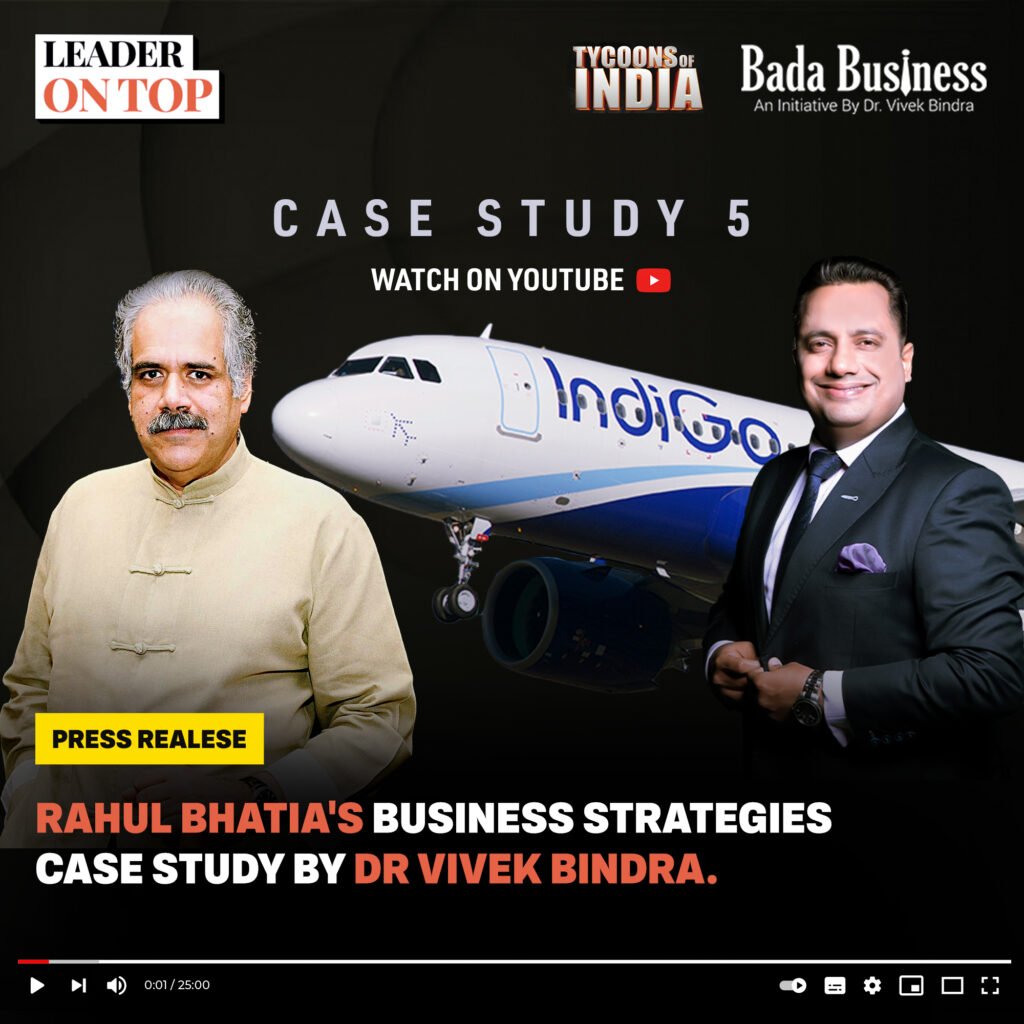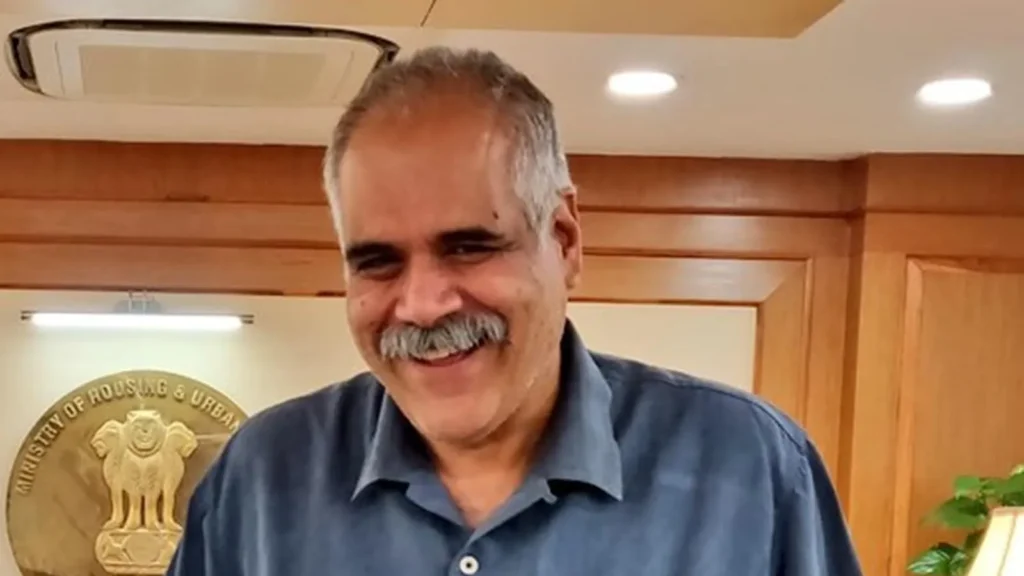Indigo Airlines, under the visionary leadership of Rahul Bhatia, has emerged as India’s largest airline, holding a significant share of the country’s aviation market. From its inception, Indigo has set itself apart with its focus on low-cost operations, punctuality, and customer satisfaction. In Dr. Vivek Bindra’s insightful analysis, we explore the key business strategies that propelled Indigo to the top, making it a favorite among Indian travelers.
Watch the full video here: Indigo Airline Case Study: Rahul Bhatia’s Business Strategies | Tycoons of India | Dr. Vivek Bindra.

1. Low-Cost Carrier (LCC) Model
Indigo’s business model is based on the Low-Cost Carrier (LCC) strategy, which focuses on minimizing operational costs while offering competitive pricing. Rahul Bhatia’s decision to adopt this model allowed the airline to cater to a price-sensitive market, enabling more Indians to afford air travel. By keeping costs low, Indigo was able to provide affordable ticket prices without compromising on quality.
This strategy included cost-efficient operations such as single-class seating, no complimentary meals, and a focus on short-haul routes, which reduced turnaround time and increased flight frequency.
2. Fleet Uniformity
One of the critical strategies that sets Indigo apart is its fleet uniformity. The airline operates primarily with Airbus A320 aircraft. This decision to maintain a homogenous fleet has several advantages, including reduced maintenance costs, simplified training for pilots and crew, and bulk-order discounts from manufacturers.
By sticking to a single aircraft type, Indigo has been able to streamline its operations, making maintenance and scheduling more efficient. This uniformity has also allowed the airline to reduce its overall costs, which translates into competitive pricing for its customers.
3. Focus on Punctuality
A hallmark of Indigo Airlines is its exceptional on-time performance (OTP). From the beginning, Rahul Bhatia emphasized punctuality as one of the airline’s core values. This focus on being on time resonated with business and leisure travelers alike, who valued reliability in their travel experience.
Indigo’s obsession with punctuality became a part of its brand identity, helping it build a loyal customer base. The airline’s streamlined processes, efficient turnaround times, and well-coordinated ground staff all contributed to its industry-leading on-time performance.
4. Efficient Cost Management
Indigo’s success is deeply rooted in its stringent cost management practices. Rahul Bhatia understood that in the competitive airline industry, controlling costs was paramount. From fuel efficiency measures to negotiating favorable leasing terms for aircraft, Indigo has consistently found ways to reduce expenses.
Bhatia’s strategy also involved keeping overheads low by outsourcing non-core services such as baggage handling and customer service. Additionally, the airline focused on maximizing aircraft utilization, ensuring that planes spent more time in the air and less time on the ground, further boosting profitability.

5. Fuel Hedging
Fuel costs account for a significant portion of any airline’s expenses. Rahul Bhatia mitigated the risk of fluctuating fuel prices by employing fuel hedging strategies, which allowed Indigo to lock in fuel prices in advance. This approach helped the airline shield itself from volatile fuel price hikes, contributing to its steady financial performance.
By carefully managing fuel costs, Indigo has been able to maintain stable pricing for its customers, even during periods of rising fuel prices, giving the airline a competitive edge in the market.
6. Lean Operations
Indigo’s approach to maintaining lean operations has been pivotal in keeping costs low. The airline does not offer luxury services like business class, premium lounges, or in-flight entertainment. Instead, it focuses on the essentials: affordable fares, punctuality, and a hassle-free flying experience.
By eliminating non-essential services, Indigo ensures that it remains efficient while delivering value to its passengers. This no-frills approach has resonated with travelers who prioritize cost savings and reliability over luxury.
7. Strong Financial Discipline
Rahul Bhatia’s leadership is marked by strong financial discipline. He ensured that Indigo always had a robust balance sheet, avoiding unnecessary debt and maintaining high liquidity. This financial prudence allowed the airline to weather economic downturns, fuel price surges, and other challenges that have affected the aviation industry.
Indigo’s consistent profitability, even during periods of turbulence in the market, speaks to the effectiveness of Bhatia’s financial strategies. By focusing on sustainable growth and careful cash flow management, the airline has remained resilient in the face of adversity.
8. Superior Customer Experience
While Indigo is known for being a low-cost carrier, it has never compromised on delivering a superior customer experience. From easy online booking and seamless check-ins to efficient ground services and in-flight hospitality, Indigo ensures that customers receive a smooth and hassle-free travel experience.
This focus on customer satisfaction has helped Indigo build a strong brand reputation, leading to high levels of repeat business. The airline’s emphasis on punctuality, cleanliness, and courteous staff has been a driving force behind its growth in customer loyalty.
9. Strategic Partnerships
Rahul Bhatia understood the importance of strategic partnerships in expanding Indigo’s reach and capabilities. For instance, the airline formed alliances with key international players to enter new markets and grow its global footprint. These partnerships allowed Indigo to offer a wider network of destinations to its customers while maintaining its cost-effective operations.
Indigo’s ability to forge meaningful collaborations with global airlines has strengthened its position in the international aviation landscape, contributing to its sustained growth.
Conclusion: The Indigo Success Story
Rahul Bhatia’s strategic vision and focus on operational efficiency have transformed Indigo Airlines into a dominant force in India’s aviation industry. By adopting the Low-Cost Carrier model, maintaining fleet uniformity, and emphasizing punctuality, Indigo has successfully carved out a niche in a highly competitive market.
Bhatia’s leadership, grounded in cost management, fuel efficiency, and customer satisfaction, continues to drive the airline’s success. Today, Indigo is synonymous with affordable, reliable air travel in India, serving millions of passengers and setting industry benchmarks in performance and profitability.
For a comprehensive breakdown of Rahul Bhatia’s business strategies and how Indigo became a market leader, watch the full case study by Dr. Vivek Bindra here: tap here.
Don’t forget to check out more exclusive stories of some more phenomenal inspiring individuals like Indra Nooyi.



